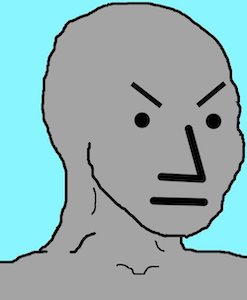My recent editorial at the Oconee Enterprise brought on a somewhat misapprehending response by guest columnist Anthony Potts. My response to his response is below:

This column is in response to Anthony Pott’s guest column last week. Some of his points are understandable since the editorial staff altered (for space reasons) a more nuanced statement in the opening preamble. The column (as submitted) did not state that “(racism) is dead” but rather “that legacy, at least as a tangible society-level property, is now dead.” Nor did the column state racism was isolated to the 20thcentury, rather that there was a parochial conception of it in the US at that time. The interested reader may see the full article, as originally submitted. My observations were focused on American society, not at any particular individual. It’s the same as noting that Americans are generally regarded as being over-weight without excluding the possible existence of thin people within that collective.
The rest of his response, however, is a collection of deliberate distortions of my column. Nowhere will you find explicitly or implicitly the statements “black people are the racists now” or “whites are now the oppressed group.” These mischaracterizing assertions reveal much about the liberal/progressive mindset. People are not viewed as individuals; but rather as part of a collective, mere cogs in the machine. The individual is the collective and vice versa. An attack or defense of the individual is seen as applying to their collective. Therefore, unsurprisingly, when presented with clear, unambiguous, video proof that Group A was accosted by Group B, the progressive will regard the argument being made as ALL members of Group A are victims and ALL members of group B are aggressors.
Finally, I must point out that it is Potts and his ilk that have an utter misunderstanding of the definition of racism. He claims I don’t know what it means, and I’ll admit I’m a bit old fashioned, but the last time I checked a dictionary there was nothing about “societal power dynamics.” The dictionary defines prejudice as “unreasonable feelings, opinions or attitude esp. of a hostile nature directed against a racial, religious or national group”. Gee that sounds a lot like racism to me, which is defined as “a hatred or intolerance of another race or other races”. If we allow the left to redefine racism to mean “people who (perceived to) hold “power” in society are engaging in racism whenever they interact with someone (perceived to) to not hold power” then like the wordsmiths on the right with their “war on terror” we will ensure never ending culture wars. You can’t win a war against a label whose definition changes.
This “racism is rampant today” narrative is further bolstered by the leftist media’s periodic outrage du-jour of a white on non-white incident that in 99.9% of cases today (i.e. the 21stcentury) turns out to be a hoax or misunderstanding. Mark my words, the “Jussie Smollet” incident mentioned by Potts will be found to have been a fabrication within 6 months 6 days and will be quietly swept under the rug.<Just call me Nostradamus – I wrote this when nearly everyone and their brother was convinced of the veracity of Smollet’s story… how quickly did that unravel…hmmmm>
Racism is but one flavor of prejudice. There are many others (e.g. sexism, anti-Semitism, jingoism, etc.) Nowhere does “power dynamic” come into play. That doesn’t mean a prejudiced individual can’t impact your life if they hold power over you in the context of that interaction but the mere holding of power does not do the reverse, it does not make them acquire prejudicial beliefs. Individuals hold power in society, not groups. Those that define you based on your perceived group memberships are the true enemies of the people for they seek to gain power (political, social, or economic) by appealing to one group while demonizing the other. The left does it. The right does it. Let’s cast off these imposed identities and interact as the individuals we are.

